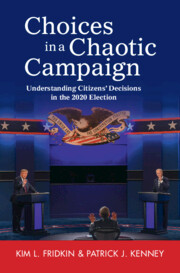Book contents
- Choices in a Chaotic Campaign
- Choices in a Chaotic Campaign
- Copyright page
- Dedication
- Contents
- Figures
- Tables
- Preface
- 1 Understanding How Campaigns Matter
- 2 “A Hot Mess inside a Dumpster Fire inside a Train Wreck”
- 3 The Priming of COVID-19 during the Campaign
- 4 Protests against Police Brutality
- 5 “A Rigged Election”
- 6 How the Campaign Shapes Voters’ Decisions about the Candidates
- 7 The Impact of Campaign Messages on the Decision to Vote
- 8 How Campaign 2020 Matters
- Appendix Survey Questionnaire
- References
- Index
1 - Understanding How Campaigns Matter
Published online by Cambridge University Press: 16 May 2024
- Choices in a Chaotic Campaign
- Choices in a Chaotic Campaign
- Copyright page
- Dedication
- Contents
- Figures
- Tables
- Preface
- 1 Understanding How Campaigns Matter
- 2 “A Hot Mess inside a Dumpster Fire inside a Train Wreck”
- 3 The Priming of COVID-19 during the Campaign
- 4 Protests against Police Brutality
- 5 “A Rigged Election”
- 6 How the Campaign Shapes Voters’ Decisions about the Candidates
- 7 The Impact of Campaign Messages on the Decision to Vote
- 8 How Campaign 2020 Matters
- Appendix Survey Questionnaire
- References
- Index
Summary
In this chapter, we describe the context of the 2020 presidential election campaign, including the COVID-19 pandemic, racial justice protests, a highly contentious debate, and challenges to the integrity of the election. We review the state of the literature, showing that messages from the candidates, political parties, and the news media inform voters about the candidates’ policy positions, policy priorities, and personal characteristics. And campaign messages, via the candidates or the news media, can alter the criteria voters consider when evaluating the competing candidates. Finally, aspects of the campaign can encourage or discourage participation in the election. We turn next to presenting the citizen-centered theory of campaigns. We argue that people’s predispositions (i.e., political and psychological) drive the procurement and assimilation of information, which influence how individuals evaluate campaign events and campaign issues, and ultimately these evaluations influence their views of the competing candidates and their voting decisions. Finally, we discuss our three-way panel study where we gather information from the same individuals at different points during the 2020 campaign, allowing us to model how campaign events change people’s attitudes about the presidential candidates.
Keywords
- Type
- Chapter
- Information
- Choices in a Chaotic CampaignUnderstanding Citizens' Decisions in the 2020 Election, pp. 1 - 36Publisher: Cambridge University PressPrint publication year: 2024

